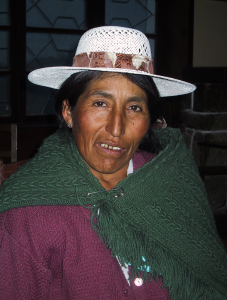News & Updates Category
The Power of Literacy
07.29.2016

Before her family came to faith, Andrea was raised in a similar way to many of the Quechua women living on the Bolivian Alti Plano. She was illiterate and afraid with a low self-esteem. This is her story:
“When I couldn’t read I felt stupid, like an animal. There were other girls who could read and they could go places because they could read the signs. I was afraid to go anywhere. I had a very low opinion of myself. For this reason when I was a young woman I would go to the fiestas and become drunk. I didn’t know how to have confidence around men and so they would humiliate me. I didn’t know how to defend myself around them. And so I became pregnant at an early age and gave birth to a daughter. I was not married, and still am not married.
After my father became a Christian, I began to attend church. When I was in church I didn’t know how to read the Bible or sing the hymns. People would give me a hymnbook and I wouldn’t know what to do with it. So, I became very motivated to learn to read. I began to learn to read when I was twenty-five. I wanted to know how to read very badly. It was a step of faith for me to begin, but I actually found it quite easy. It made me very joyful to be able to read, and I still feel that way.
When I was learning to read I began to understand the gospel. This was because part of the materials included Bible lessons. At that time I became a believer. I continued to learn through the various levels. The third level is a Bible training course for church leaders. I finished this as well.
As I progressed through the literacy course it caused me to realize that I had something to contribute. My ability to read integrated me with the church people and the broader community, first as an equal and later as a leader. Learning to read was a miracle. Because I saw God help me with this it gave me the faith to trust him in many other areas. In addition, because I could read it made me feel equal to other people. It made my family life calmer. This was because I didn’t always react out of my insecurity, but I could listen to what another person was saying without fear.
It is very important for other women to learn to read. When they read they become equal to men. They can take better care of their children and their animals. Women who can read can help their children when they go to school. They can read the Bible and other books to their family (the reading program includes post primer materials on nutrition and animal care).
Through the Bible I learned how to take care of my family and how to get along with people. I tell other women, “If I can learn to read, you can learn to read”. This is because I never went to school for even one day. I now have more confidence than many Quechua men. I feel that whatever God wants me to do I will be able to do it.”
